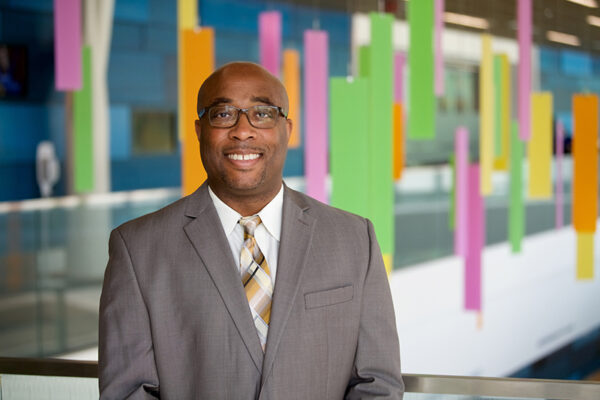
Frankie Madison, LSW, is a mental health therapist at Akron Children’s Behavioral Health, Boardman.
Every day at Akron Children’s, we strive to deliver compassionate care and create positive experiences for our patients and families. This month, we’re spotlighting Frankie Madison, LSW, a mental health therapist at Akron Children’s Behavioral Health, Boardman, who recently received the following feedback from a patient family:
“Frankie (Madison) is an amazing asset to the facility. My child is the patient seeking counseling, but his methods of incorporating the family makes my son’s counseling successful. I’ve never been to a session where he didn’t check on the parents to make sure they were involved and informed. Frankie Madison goes above what I would call standard treatment/counseling. Going to Frankie at this point seems like going to an extended family member’s house. My son loves him, and as a father, I love him, as well. Frankie counseled and led my son through suicidal thought, a broken home, living with two different parents who have 50/50 custody, the custody case in general, problems in school, problems with the opposite gender, being bullied, being the bully, school in general and many other topics. Anything life throws at my son, there is always someone to talk to. We have been seeing Frankie for over two years now, and I don’t plan on ever changing counselors. ([I say]”we” as I feel like he is my counselor as well, but he is not.)”
How long have you worked at Akron Children’s, and what’s your role?
I’ve been at Akron Children’s in my current role for about 6 years. Prior to that, I worked in our Public Safety department from 2009 until 2011. Once I graduated from Youngstown State University with my bachelor’s degree, I worked in juvenile case management before returning to Children’s.
Now, as an outpatient therapist, I have a wide range of kids I work with from ages 5 to 18. I have to say, it’s probably my dream job. It’s what I’ve always wanted to do.
Reflecting on this experience and the feedback you received, how do you feel about it?
I feel reassured that I’m doing the right thing. When speaking to other therapists, we often talk about how we sometimes feel imposter syndrome. We want to make sure we’re doing the right things for our patients and families, and sometimes, there’s second-guessing with that. You’re not dealing with something straightforward, like a car repair; you’re supporting a family’s life. It feels good to be recognized and know that I’m doing the right thing.
As we see more children in need of mental and behavioral health services, how do you support parents during such a challenging time? What advice do you have for them?
The best way I can support parents is by being as unbiased as possible. Everyone’s experience is different. I also draw from my own experience, because I have three daughters. I understand how frustrating parenting can be, but I also know how rewarding it can be.
I try to show them that I’m just as human as they are. Talking to a therapist can be intimidating for families. I use appropriate self-disclosure to let them know there are times where I get upset or yell for my kids to get their stuff off the stairs after I’ve tripped over their shoes. Parenting is hard, and I reassure them of that. It can be difficult to suggest behavioral interventions. We need to make sure we’re not pointing the finger or making them feel like a bad parent, because they’re not. They’re taking a great step to help their child just by reaching out for our services.
What does patient- and family-centered care mean to you? How do you strive to deliver that care?
As therapists, we work hard to maintain appropriate boundaries with families. But it would be ignorant of me not to address the parent’s mental health when I see them struggling, too. We are working with children, but parents and guardians are their first support base. If they’re struggling, how can we hope to sustain any progress? I often ask parents how they’re feeling, and I have offered references for their own mental health services. It really is a family-centered approach. If we don’t involve the family, there won’t be the success that we’re looking for.
What do you most enjoy about your work at Akron Children’s?
I enjoy working with kids and helping them see their own resilience. Unlike some adult mental health situations, kids don’t have a lot of choice. They’re not able to control their home or some of their trauma. But they can still come in and laugh. I like helping them recognize their own strength. I will often say, “There are some adults who can’t do what you just did. You’re doing amazing.”
I also like leading families in the right direction. There are some kids who come in and their needs are outside of my scope of practice, but I can help them find the right fit or the right level of care.
I’ll also add that as therapists, we have busy schedules, and we can suffer from compassion fatigue and burnout. Having leadership that cares makes a difference. Self-care is promoted at Akron Children’s. We also have a strong team environment where we can laugh and support each other, and that’s a big part of what I enjoy about it.










